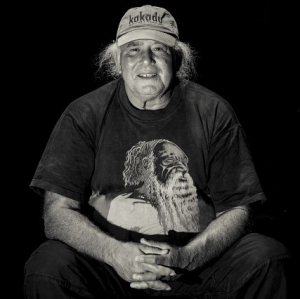Peter MALONE
Fatale
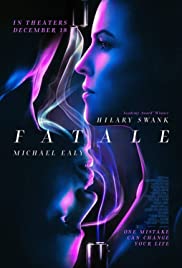
FATALE
US, 2020, 104 minutes, Colour.
Hilary Swank, Michael Ealy, Mike Colter, Damaris Lewis, Tyrin Turner, Danny Pino.
Directed by Deon Taylor.
The title quickly signifies what we are to expect. Will there be a femme fatale? And, with the overtones of Fatal Attraction, will there be a man entangled with an uncompromising woman?
Actually, for the first 20 minutes of this film, it goes exactly as might have been expected. Michael Ealy is Derrick, something of a self-made businessman, agent for sports stars, working with his best friend as partner, with a very glamorous wife and a very large affluent mansion. But, tension at home. A visit to Las Vegas, his partner encouraging him to temptation, a one night stand, hello and goodbye! Well, of course, definitely not goodbye.
Because the first 20 minutes are so expected, we are sitting in our seats wondering when the twists will come and how effectively twisted they will be. They do come – and they are!
In fact, in the second 20 minutes of the running time, there are quite a number of twists involving a reconciliation between Derrick and his wife, a home invasion, police investigation.
And Hilary Swank plays the chief detective, investigating the robbery, but discovering more and more about Derrick, his wife and his partner – and quite some twists.
Which means that the third 20 minutes of the running time leads to twists within twists! There is a story of an up-and-coming political man who is accused of financial double dealings protesting innocence, rather arrogant – and then the discovery that he has been married to the detective, which does, of course, lead to a few more twists.
After an hour of running time and involvement in the anxiety of Derrick, the strong presence of Hilary Swank (always a strong and commanding presence on-screen) and further leads in the investigation, the next 20 minutes introduces the murders. Building up more and more tension, and a focus on Derrick as the most probable suspect.
There are only 20 minutes left in the running time so that has to be for the solutions and the resolutions. Once again, not exactly what we might have anticipated but some violent confrontations. Will and can Derrick survive?
So, a variation on the Fatal Attraction scenario, always an interesting and involving movie pastime.
- The title and tone? Femme fatale? Fatal Attraction and its overtones – and plot parallels?
- The Los Angeles setting, affluent world, the vistas of buildings, freeways…? Lavish mansions and interiors? Lavish offices? Police precincts? Beach homes and the beach? The visit to Las Vegas, casinos, hotels? The musical score?
- Derrick, his business, business meetings, successful contracts, representing the sports stars? Partnership with Rafe, their friendship? Affluence? The gradual revelation about his past, poorer beginnings, his mother support? Crime, his cousin taking the rap – and his gratitude towards him and giving him money? Rafe’s objections? His relationship with Tracie, becoming brittle, questioning her about arriving home late…?
- The visit to Las Vegas, letting off steam, Rafe encouraging him, the bar, Val and her manner, beginning to talk, dance, the night, her sexual demands, his reactions? Leaving?
- Derrick and the reconciliation with Tracie? The night, the intruder, the violent fight, Tracie’s reaction? Not calling 911? The arrival of the police? Derrick and his shock to find Val in charge? Her manner, questions? Derrick in shock? Apprehensions about exposure?
- The further investigations? The discussions with Val, at headquarters, not recorded? The ambiguity of her reaction? Her reputation as top investigator? Insinuation of threats of exposure?
- The background of Val’s story, her divorce from Carter, the television information about Carter and his being investigated, his denials? His wife? His daughter, issues of custody? Val, her threats? Carter and his rejection, despising Val?
- Val, Tracie and the beach house, the revelation to Derrick about Rafe and Tracie and their affair? His angry reaction? Val taunting him, his anger and killing them? Yet Val continuing to taunt Derrick, another sexual encounter?
- The murders, Derrick implicated, the guns, the motivation? Val and her pressure? Derrick talking with his cousin, the cousin and friend? Their going to confront Val, her turning the tables on them, killing them?
- Derrick, discussions with his mother, her continued support, urging him to hold his head high?
- Val and her power over Derrick, the guns, asking him to kill Carter and her being prepared to let him go?
- The plan, Derrick, the gun, the underpass, the confrontation with Carter, Derrick trying to warn him, Carter and his violence, the shot, Carter’s death? Going back to Val and confronting her?
- Val, her intentions, the motivation for revenge at Derrick’s treatment of her in Las Vegas, obsessive? The confrontation, the shooting, are using him? Both wounded? And Derrick revealing that he had taped her and had her confession?
- Audiences enjoying variations on the fatal attraction themes?
First Love/ Japan

FIRST LOVE
Japan, 2020, 108 minutes, Colour.
Masayuka Kubota, Sakurako Konishi, Shota, Sometani.
Directed by Takashi Miike.
A rather enticing title, a gentle invitation to experience the blossoming of love. But, what follows is not exactly gentle nor genteel! This is a crime drama, drug dealing drama, a tough fist fight and sabre-wielding action, one might say, extravaganza.
It is probably prudent to write in a review that this is a Japanese drama that will not appeal to audiences who find it difficult to cope with on-screen violence. Rather, it is for a niche audience for the films of Takashi Miike, very popular in Japan as well as round the world, his films range from samurai blade films to gangsters and guns). It is a film which appeals to his fan base (and bloggers wax enthusiastic about his films and about First Love).
So, a question arises, will one become part of this fan base? An IMDb blogger suggests an approach: “When one goes to see a Takashi Miike film one expects certain things. It has to be grotesquely violent, slightly tongue in the cheek and an over the top story that that would never work with anyone else at the helm.” Another fan adds: “Devilishly intricate and delightfully insane “
So, how does First Love fit in with this scenario? Actually, the title doesn’t come up for 13 minutes, after an introduction to central characters and complex and conflicting themes. There is young Leo, training to be a boxer. There is Yuri, sold by her father to drug dealers, her having to pay off his debt by prostitution, and her becoming a severe addict. Then there is the corrupt policeman, doing deals with the Yakuza, a tough boss getting out of prison, a baby-faced psychopath who will cause all kinds of trouble – and mayhem.
And, yes, as the corrupt policeman is dragging Yuri down the street, plans to get hold of a bag of drugs, Leo bumps into him and Yuri runs away. Not exactly Romeo and Juliet, but one might say with some overtones, touches of tragedy, pursuit, threats, the prelude to love, and saving-love in action.
There are quite a lot of characters in this drug dealing world and in the world of the Yakuza, as well as rival Chinese gangs, all in pursuit of the drugs, but complicated by the psychopath and his greed, his outbursts of violence, carelessly and viciously killing people but getting his comeuppance from one of his victims whom he tried to kill by burning her apartment, confronting him in a clothing warehouse and (spoiler!) decapitation.
In the culmination of the action that does take place in this warehouse, all the interested parties are present, pursuits, shooting, fights, swords, and the police arriving with machine guns.
Actually, the end of the film does have the tone of first love, some gentle sequences with Leo and Yuri, his boxing, her cold turkey experience, some nice sequences in broad daylight with ordinary people around.
For the fan base.
Song of Granite
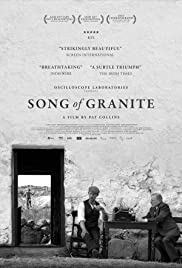
SONG OF GRANITE
Ireland, Canada, 2017, 104 minutes, Black and white.
Colm Seoighe, Michael O' Chonfhaloa, Macdara O' Fatharta.
Directed by Pat Collins.
Probably very helpful to indicate immediately, from the IMDb, the focus of this rather sombre film: “Born in a remote village on Ireland's west coast, Joe Heaney conquered the shyness of his youth to become one of his country's most revered traditional vocalists, as chronicled in this lyrical biopic.”
In fact, Song of Granite will probably a better for those familiar with the Joe Heaney. Those not familiar with and his career would be challenged by the style of the film, not a great deal of background information given, but rather the audience entering into this particular world, its atmosphere, the early decades of the 20th century, out in remote villages in the west of Ireland.
The film focuses initially on the boy Joe, a quiet lad, the fishing in the village, birds and eggs and nests, going to school, the severity of instruction and memorising of the catechism, the questions and answers about God. There is a long tracking sequence with Joe at one end of the village and the camera tracking him through as he walks right through the village, the audience able to get an overview and a feel for his background. He is invited to sing in school. He is a quiet singer. And he is encouraged by his father.
The audience has to keep attention to the change of time, the 1940s and 50s, Joe growing up, away from home, his singing, the popularity, the audiences, their joining in, his collecting of songs. And then there is a transition to his being in the United States, minimal explanation given, just some reference to dates in the 1960s. There is a reference to his going to the Newport Festival in 1966 and his singing with the Clancy Brothers.
Joe is away from home, a job standing in uniform outside a hotel in New York City, but continuing his singing.
And, then, there is the older Joe, looking back on his life and achievement, the range of songs collected, the number recorded, his heritage of Gallic music, his looking back over the past, success and failures, a yearning for his home in Ireland.
Director Pat Collins is a documentary maker and, in many ways, this is a documentary film about Irish music and song it could be considered has a biopic interspersed with a great number of songs. Or, it could be considered a documentary on Irish music and song interspersed with some touches of biography.
Amish Murder, An
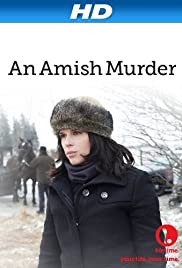
AN AMISH MURDER
US, 2013, 85 minutes, Colour.
Neve Campbell, Noam Jenkins, Jilon Van Over, Christian Campbell, C. Thomas Howell.
Directed by Stephen Gillenhaal.
While the title does not tell all, in does tell us succinctly the focus of this crime drama.
The setting is Amish territory, some glimpses of the Amish, indications of their way of life, their attitude towards the growth of technology, their sense of community, working the land, coexisting with the 20th and 21st-century.
Neve Campbell plays Katie, the chief of police in the town in which she grew up and, as gradually revealed, she was from an Amish family, assaulted when young, her father killing her assailant and burying him, her leaving the community, her potential fiance shocked and grieving. She has returned to the town but is ignored by the community.
And then there is a murder, an Amish girl. Indications of a serial killer. The film is strong on police procedure, Katie and her skills, the range of people who work for and with her, the local police authority (C.Thomas Howell), an interfering Mayor whose daughter is killed, the calling in of an expert in profiling much to Katie’s objection.
The film proceeds with the investigation, interviews with the Amish, Katie with her brother and former fiance, the Amish Bishop. Katie has her secrets but gradually reveals them to the profiler who is suffering from PTSD.
There is some drama and melodrama in the revelations, the final confrontation with the villain.
One might say nothing particularly special, except the Amish setting, the kind of routine crime drama that audiences enjoy.
- The Amish community, traditions, isolation, beliefs, attitude towards those who leave? The situation for the murder? The victim?
- The town, the Amish community, police precincts, homes, locations? The musical score?
- Katie, police chief, gradual revelation of her past history, originally Amish, the experience of the rape, her father killing the assailant and burying him, the reaction of her brother, her leaving, 17 years, studies, work as a detective, application for the job? Seeing her jogging, passing the Amish, their observing but not looking?
- The victim, Katie, the staff at the police station, the policeman with the cows blocking the road and finding the body, the various personnel and their jobs? The mayor, the political issues, his interventions, the death of his daughter, his grief?
- Nathan Detrick, the local police, his cooperation? His work, Katie being fired, his sympathy? Audience suspicions of him? Gradual revelation of his background, his years in Alaska, his home, the search for information about the abandoned house? The confrontation with atie, drugging her, tying her up, his intentions, the bath?
- The calling in of the outside expert, Katie’s reaction, John Tomasetti, casual, gradual revelation of his story, crime investigations, the revenge on his wife and family, PTSD, his profiling, the past history of the serial killer, the documents, the Roman numerals, his discounting the copycat? Working with Katie, gradual revelations of their stories, the night together, there needs?
- The Amish, the refusal to talk to Katie during the investigations, the role of the Bishop? Katie’s brother, his wife, her going to talk with him, the burial of the body? The wife sending the note to the Bishop, stating that her brother always loved Katie, his searching for her?
- Lucas, the past relationship with Katie, her leaving, leaving no explanation? Her apology, seeking his help with the Bishop?
- The investigation on Detrick, his time in Alaska, the serial killer? The encounter with Katie, his explanations, random motivation?
- The police, the attack, Katie rescued, Detrick taken? Her being reinstated? And future bonds with the Amish?
Best Sellers/ 2020
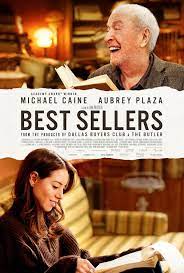
BEST SELLERS
UK/Canada, 2021, 102 minutes, Colour.
Michael Caine, Aubrey Plaza, Scott Speedman, Ellen Wong, Cary Elwes, Luc Morissette, Veronica Ferres.
Directed by Lina Roessler.
Best Sellers tend to be big, popular, often obvious, but delighting in twists. This is not that kind of film!
Rather, this is a story about publishing, publishers’ desires (as Well Is being driven) to find the next bestseller, to get the author under contract, to promote the book. And, the screenplay is fairly serious about it – except that it also takes a critical look, a satirical look, entails.
But the best thing to say, of course, is that this is a Michael Caine film. And, there he is, 55 years after Zulu still getting top billing. And, at time of filming in 2019, he was 86. And there he is, the familiar face if older, the familiar voice, just the same. And a cheeky attitude towards life.
We see him at the opening thumping his typewriter, finally writing The End to a manuscript. He is Harris Shaw, famous, but his only novel having been published 40 years earlier. He is old, cantankerous, dependent on the bottle.
We are then introduced to Lucy (a complex performance by Aubrey Plaza), a publisher who has inherited her respected father’s company, working with her assistant, Rachel (Evelyn Wong). Crisis. Their latest bestseller has lost the status of best, removed from store windows, being pulped! What is Lucy to do.
The answer, of course, is Harris Shaw. But, an encounter with him at home which, to say the least, is unpropitious! Lucy is poised in the very moment of signing away her company when Harris arrives.
We are witness to all the complications of contracts, authors’ demands, publishers’ desperations, questions of editing, Harris reluctant to do the promotion tours but consenting. But, with intention of sabotage. His main weapon, rather British, is a nine letter word which is repeated, repeated, repeated, taken up as a chant, taken up as a mantra by those who attend the launches, “Bullshite”. What follows is something of a catalogue of disasters that can erupt during a promotion tour when the author is unwilling, who has some contempt for his audiences let alone the publishers.
You know that something good is going to happen – or at least we hope so. And Lucy does get a brainwave, a tip for publishers in a social media age, having a range of ordinary people filmed for Youtube clips reading sections of the book. Some effective promotion. But, we are reminded that fewer people read books these days and that audiences go for trends rather than quality.
As always, some unwelcome truths are revealed, a quiet peace is possible. Lucy has to take stock of her life and her future. For Harris, of course, there is very little time and future.
But, there is a nice twist ending that we could not have anticipated, meaning that we finish the film and the final credits smiling.
- The title, book publishing, niche publishing, publishing difficulties? Bestsellers, quality, marketing, sales? An ironic perspective on publishing and promotion?
- Canadian/New York settings, vistas of the city, streets, publishing houses, offices? The contrast with the home in the country, the countryside, winter? The home for the elderly? The musical score?
- Audiences wanting to see Michael Caine in his later 80s? His long screen presence, characteristics, look, voice, accent? Playing at cantankerous old men? His skills and communication?
- Harris Shaw, seeing him at the typewriter, phone calls and swearing, typing, The End? Elderly, at home, alone, memories of his wife, love for his cat? The one book published 40 years earlier, his reputation? Nothing since?
- Lucy, publishing, Rachel as her assistant, the pressure to sell the business, inheriting it from her father, his portrait in the boardroom? Jack, wanting to buy, visits, pressure for sales?
- Lucy and Rachel, dilemmas, finding their latest publication withdrawn, bad reviews…? Going through the back list? Discovering Harris Shaw? Lucy and her memories of a father working with him? Phone calls, the visit to the house, his being cantankerous, the rifle, refusing consideration, ousting them?
- His change of heart, arriving with the manuscript, not burning it, Lucy and the details of his contract, concerning editing, the publicity tour, the confrontation, his decision?
- The satiric presentation of his tour, drinking, not getting up before midday, dishevelled, meeting people, despising them, the repetition of “Bullshite”, it becoming a mantra? The T-shirts? The young people, chanting, egging him on, but not buying the books? Lucy and the exasperation of the trip, Harris and his behaviour, discussions, hostility? His walking out sessions, insulting people? The prospect of the television show, Lucy rehearsing with him, his monosyllabic answers?
- Rachel, advice for Lucy, minding Harris’s cat?
- The initial launch, Harris’s bad behaviour, on the balcony, watching people, calling out to them, the reviewer from the Times and his insulting him, arrested, the police photo? Notoriety?
- Lucy, the experience of the promotion, Jack and the sexual advances? Exasperated, the device of having different people read texts, social media, popularity, sales, selling out at a meeting, autographs?
- Lucy and Harris getting to know each other better, his gradually revealing aspects of his life, especially his wife? Lucy and her emendations, his reading them?
- The visit to the home for the elderly, the discovery that her father was alive, dementia? The impact on Harris? His writing on the wall? The revelation of the truth, Harris and his wife doing all the editing, Lucy’s father taking the credit?
- Harris going to the bookshop, setting the books alight, hospital, the diagnosis for his future?
- Lucy and her visit, the talk, scattering his wife’s ashes in the grounds? The creditors, wanting money for the house? His death, Lucy scattering his ashes?
- Lucy and the decision to sell, Jack pleased, the rifle, ousting him? Taking down her father’s portrait? The investment in Harris’s house, going to the house, the note in the typewriter, the attic, and discovering the manuscripts from over 40 years since his wife’s death, not edited? His bequest? Her future?
Great White
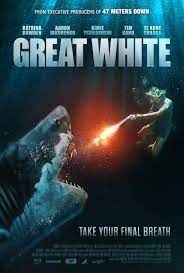
GREAT WHITE
Australia/US, 2021, 91 minutes, Colour.
Katrina Bowden, Aaron Jakubenko, Kimie Tsukakoshi, Tim Kano, Te Kohe Tuhaka.
Directed by Martin Wilson.
Another film about sharks. One of the difficulties of making a film in this vein is that the 1975 Steven Spielberg film, Jaws, is the archetype of such shark dramas. There have been many since but tend to be rather ordinary, routine in their storytelling, smaller budgets, short running time – but for some an entertainment in the cinema or, especially, on television or streaming services.
This film was made in and around the coast north of Brisbane and the scenery is quite spectacular.
The plot is fairly straightforward. There is an introduction with a happy couple swimming in the water, taking selfies, the man suddenly taken by the shark, the woman frantically swimming towards their yacht, and then her being taken.
The audience is then introduced to the central couple, Charlie and Kaz, she announcing she is pregnant, they running a business with a small plane and tours. They get a booking, a woman, Michelle, from Japan whose grandfather turns out to be the only survivor of a shipwreck out from the shore, and her analyst husband who is fearful and quite obnoxious!
The couple charter the plane and the associate cook goes along for the ride, taunting the analyst, who is particularly critical. When the young woman goes to scatter her grandfather’s ashes, they come across the body of the man taken by the shark. They decide then that they should search for the yacht in case the woman is still alive. They discover the yacht. She is dead.
But, then the shark, eventually two sharks, attack, sink the plane, and the rest of the film is the five on the raft, shark attacks, bickering, rowing, going with the tide, the analyst angry with the cook and shoving him, the cook falling overboard, taken by the shark. In such screenplays, there is also retribution and the analyst himself eventually is taken.
Charlie has memories of being bitten by a shark, has a scar to match. He also has some flashbacks. However, ultimately, he goes into the water to lure the shark away so that the two women will be saved. They also have quite some heroics, Kaz going overboard to lure the shark into the shipwreck and kill it, but with Michelle coming to fight with her.
One might describe the film as ordinary – too ordinary for some, but a pastime shark entertainment for many.
Belles of St Trinians, The
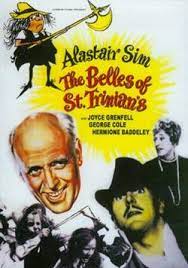
THE BELLES OF ST TRINIANS
UK, 1954, 89 minutes, Black-and-white.
Alistair Sim, George Cole, Joyce Grenfell, Hermione Baddeley, Betty Ann Davies, Renee Houston, Beryl Reid, Irene Handl, Mary Merrall, Joan Sims, Lloyd Lamble, Richard Wattis, Guy Middleton, Michael Ripper, Sid James.
Directed by Frank Launder.
The cartoons by Ronald Searle were very popular during the 1950s. There was his eccentric and sketched history of William the Conqueror and England, 1066 and All That. But he also had a series of cartoons about mischievous, raucous, misbehaving schoolgirls who caused mayhem at the school of St Trinians.
There were three film versions of these cartoons, this being the first, with the rather genteel name of Belles. (The subsequent films pulled no punches in the titles: Pure Hell of St Trinians, Blue Murder at St Trinians.)
The material in this film is somewhat similar to the very entertaining comedy of 1950, The Happiest Days of Your Life, about boys and girls schools billeted together, starring Alistair Sim and Margaret Rutherford with Joyce Grenfell as the sports mistress.
This time Alistair Sim plays a double role. The main focus is on his Millicent Fritton, the old-style principal of the school who is not above a great deal of double-dealing, especially since the school is in debt. Alistair Sim also plays her bookmaker brother who is precocious, troublemaking daughter, is a pupil at the school.
Part of the comedy is how much dread the girls inspire in the locals, boarding up their shops, railway staff disappearing, the police shuddering.
And, the girls are distinctively raucous, some with a touch of glamour in the senior years, hockey players, flirting, especially with two education Department assistants who disappear into the school – with Richard Wattis as the head visiting and finally succumbing! But the main action takes place with the younger girls, setting up all kinds of traps for the staff, smoking and gambling…
The main plot involves racing, with a Sheikh sending his daughter to school which is near where his stables his horses. The bookmaker has the intention of nobbling the horse. In the meantime, the horse is kidnapped and held in one of the dormitories. All kinds of comedy of the horse within the school, lowered down from the window, finally getting to the racecourse and winning, to the delight of Miss Fritton and her brother having to escape (alongside with his associate, Sid James). One of the stars of the film is George Cole as Flash Harry, the go-between with the gin that the girls make in the chemistry laboratory, who is charged with putting a bet on the horse. Flash Harry was to appear in the other St Trinians films.
And, on the side of the law, Joyce Grenfell is a policewoman asked to disguise herself as the sports mistress to find out what is going on and to report to her fiance, the head of the police. She is the subject of all kinds of pratfalls, ultimately writing her report on the linoleum on one of the school floors and wrapping it up, riding a horse to inform the police!
The film was written and directed by the team of Sidney Gilliat and Frank Launder. Of its time, but much to amuse.
Kev Carmody, indigenous composer and singer, Downlands College, 1959-1963.
Kev Carmody, indigenous composer and singer, Downlands College, 1959-1963.
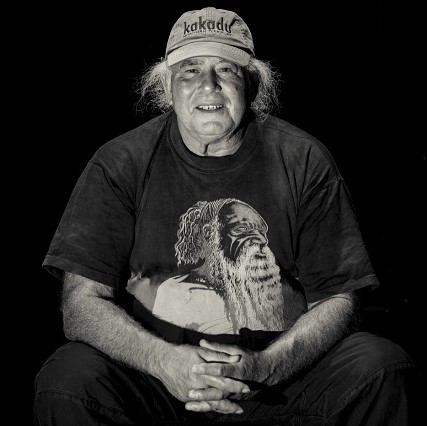
The 2021 National Indigenous Music Australia celebrated the life and vastly important work of Indigenous musician Kev Carmody, inducting him into the Hall of Fame.
From the Downlands Magazine 2020
In August 2020 Kev featured on the cover of the Weekend Australian Magazine, along with an in-depth interview completed near his home outside Ballandean.
In 2019 Kev was awarded Australia’s highest accolade in the performing arts, the
JC Williamson Award, as part of the Helpmann Awards. We congratulate Kev on his exceptional acheivements in the field of music!
Kev, together with his wife Beryl, responded to the following questions...
Where are you from?
My grandfather’s country is from the Lama Lama Nation on Cape York.... grandmother’s Indigenous country is Bundjalung, Northern New South Wales.
(My) Irish heritage comes from County Clare and grandfather’s heritage mid-Tipperary.
How did your musical path begin?
In my mother’s womb...sounds and rhythms of her heartbeat and mine.
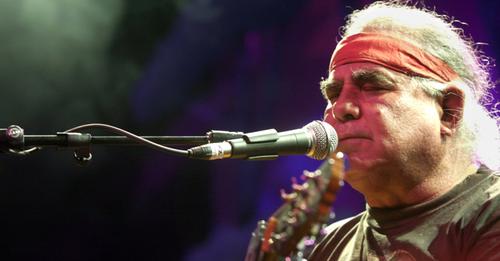
What do you consider the greatest achievements of your life thus far?
Our families and living until 70.
What inspires you as a musician?
The Universe.
Please tell us about how you felt when your musical achievements were acknowledged through the Helpmann Awards – JC Williamson Award.
I accepted the JC Williamson, Helpmann Award on behalf of all First Nations’ Peoples.
Please tell us about what inspired you to collaborate with your son and grandsons to produce the song about the story of Multuggerah?
Our son Paul wrote a poem about the warrior Multugerrah who resisted European expansion. He wanted me to narrate and record the poem and this involved the grandsons Cortay on clap sticks and Manson on didge. I then put music behind the poem and wrote a chorus for it which made it into song.
Who was your favourite teacher at Downlands and why?
Evan Whitton – because he had faith in my ability and helped me to develop confidence and to challenge myself.
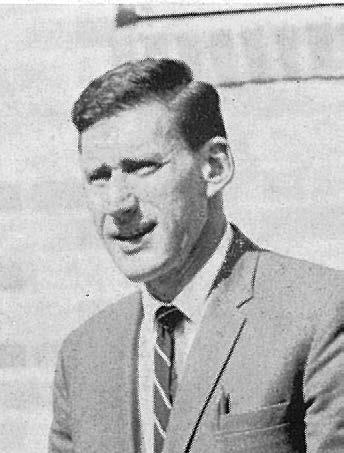
Evan Whitton
Any advice for current students? Challenge your abilities and have strength and confidence in your chosen life paths.
Challenge your abilities and have strength and confidence in your chosen life paths.
Is there anything else you want to add – any inspiration for the current Murri students?
You belong to the oldest living culture on Earth. Be proud and learn everything you can and where possible contribute to this ancient cultural gift.
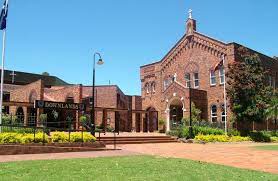
Is there anything else you’d like to say about your multi-generational involvement with your grandsons, now members of the Downlands Community?
I am proud of all our children and all our grandchildren. Paul and his wife Tawana have contributed to Downlands College and to sport in general over time. Cortay and Manson are continuing to develop and achieve at the College.
From Wikipedia
Kevin Daniel Carmody was born in 1946 in Cairns, Queensland. His father was a second-generation Irish descendant and his mother an Indigenous Australian. His younger brother, Laurie, was born three and a half years later. His family moved to southern Queensland in early 1950, and he grew up on a cattle station near Goranba, 70 kilometres (43 mi) west of Dalby in the Darling Downs area of south eastern Queensland. His parents worked as drovers, moving cattle along stock routes. At ten years of age, Carmody and his brother were taken from their parents under the assimilation policy as part of the Stolen Generations and sent to a Catholic school, Downlands College, in Toowoomba. After schooling, he returned to his rural roots and worked for seventeen years as a country labourer, including droving, shearing, bag lumping, wool pressing and welding.
In 1978, at the age of 33, Carmody enrolled in university, Darling Downs Institute of Advanced Education (now part of the University of Southern Queensland).
Due to his limited schooling, Carmody's reading and writing skills were not up to required university standard. Undeterred, he suggested to the history tutor that until his writing was suitable he would present his research in a musical format accompanied by guitar. While this was a novel approach at university, it was in line with the far older indigenous tradition of oral history. Although Carmody had extensive historical knowledge, learnt by oral traditions, much of it could not be found in library history books and was attributed to 'unpublished works'. Carmody completed his Bachelor of Arts degree, then postgraduate studies and a Diploma of Education at the University of Queensland, followed by commencing a PhD in History, on the Darling Downs 1830–1860.
From the Downlands 1963 Rugby report:
K. D. CARMODY: Scrum half and Vice-captain. Carmody’s talent inclined more perhaps to wing-forward or threequarter and, at first, he was technically a mediocre scrumhalf. By much lonely practice, he made himself more than competent and if anyone (apart from the coaches) had an armchair ride on Grammar Day, it was his partner, Carrigan. He performed prodigies of defence and one doesn’t suppose Downlands has ever had a better half at following-up a punted ball. Sixteen matches. Coaches: Rev Fr J F Tyler MSC (Backs) and Mr Evan Whitton (Forwards)
(below) Downlands First XV 1963
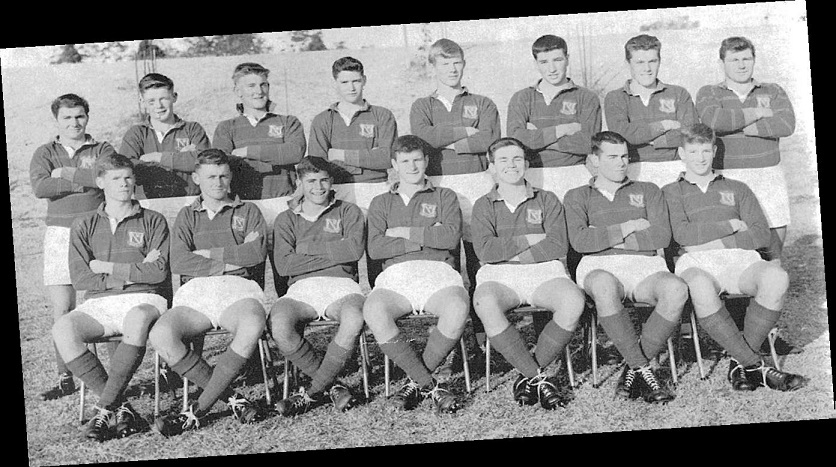
KC Front row, third from left
Perhaps his life illustrates, From little things, big things grow.
Rogue/ 2020
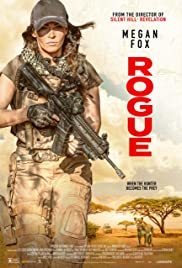
ROGUE
US/South Africa, 2020, 105 minutes, Colour. New paragraph
Megan Fox, Philip Winchester, Sisanda Henna.
Directed by MJ Bassett.
There is an ambiguity in the title. Who is the Rogue? The military force and the leadership? The Al Shebab terrorists and their leader? The fierce lionesses who will wreak vengeance and destruction?
This is the kind of film which was named in more recent decades, “Straight-to-video”. It is an action show, filmed on location in South Africa, with a more generic African setting, especially the Al Shebab terrorists.
For those who want a straightforward action show, a military group, an attack on the terrorist compound, mixed success, the necessity to escape, dangers and the escape, seeking refuge in abandoned farms, under siege for a night, getting a generator going and communicating a message to headquarters, assistance not being able to come until the morning, the siege becoming an attack and defence. More or less as expected.
There are complications in the initial attack on the terrorist compound, the discovering of young women, hostages in cages, daughters of international educators, taken for bargaining. They escape with the attacking force, pursued, having to leap from high cliffs, surviving in rapids – or not.
The leader of the expedition is, unexpectedly, Megan Fox who explains her situation, the years as a teenager in military school, highly trained. There are quite a number of people in the supporting force, many of them killed. There is the loyal supporter with his gun. Another member who encounters a herd of elephants going through the abandoned farm. There is also a local – a more interesting character than the rest, confronted with great hostility by the hostages, identified as Al Shebab but explaining the situation with his wife and children, his survival, his cooperation with the military force.
There are glimpses of the villains, Savage, building up to a confrontation between the arch-villain and Megan Fox.
But, especially with a message from the director at the end of the film, there is a focus on abuse of wildlife, an accusation against South Africa for confining lions and lionesses, ill-treatment, capture for their skins and trade. Which means then that there are minuses throughout the film, especially at the beginning when they are captured, and confined to cages. And, more at the end, when they are loose, viciously attacking their captors, and a final confrontation between the mainl liones and the archvillain.
Bloggers were not particularly enthusiastic – but, the film makers set out to make a lively action show, action and then lulls and suspense. And the continued question as to whether Megan Fox should have been cast in the central role.
Woman in the Window, The/ 2021
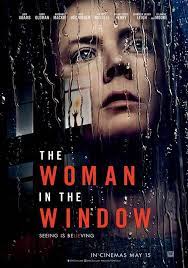
THE WOMAN IN THE WINDOW
US, 2021, 100 minutes, Colour.
Amy Adams, Fred Hechinger, Gary Oldman, Julianne Moore, Jennifer Jason Leigh, Wyatt Russell, Brian Tyree Henry, Anthony Mackie.
Directed by Joe Wright.
There are substantial ambitions for the success of The Woman in the Window, directed by veteran Joe Wright (Atonement, Pride and Prejudice) from a screenplay by actor-director, Tracy Letts (who appears as the doctor in this film).
However, audience tests were not successful and there was a reworking of some sequences of the film. The covid 19 pandemic prevented cinema release and the film went to streaming services.
The film has a very strong and very able cast, led by Amy Adams as a child psychologist who suffers from agoraphobia, is separated from her family. Oscar-winners Gary Oldman and Julianne Moore appear as a couple. Fred Hechinger appears as their son.
However, all is not as it seems. Early in the film, there is specific reference to Hitchcock’s Rear Window on which the screenplay is obviously based and pays homage to. There are also visual references to the classic thrillers Laura and Hitchcock’s Spellbound.
There is quite some complicated background, the psychologist involved in a car accident with deaths, her supporting a mysterious border in the house (Wyatt Russell), the pressure of her psychological state, contemplating suicide. There is also a visit from the couple whom she observes from her window, who act mysteriously, and her witnessing the murder of the wife. There is some attachment to the teenage son and his freely coming in and out of her apartment.
There is a police investigation. There are some of the deaths. There are various clues to a mystery, and the revelation of a serial killer murderer.
It seems a pity that with such good ingredients, that the film does not have the impact that it might.
- The title? Focus on Anna, agoraphobia, watching, the drama? And the parallels with Hitchcock’s Rear Window? The initial glimpse of the clip (and Laura and Spellbound)?
- The claustrophobic action, within the house, within the main room, staircases, basement, roof? Looking across the street into windows? The flashback, the car, the crash? The musical score?
- The scenario following each day of the week?
- Anna Fox and her story, Amy Adams; presence? Age, withdrawn, no make up? Staying in her house? Drinking, pills? Ultimately preparing for suicide? The visit of Dr Landry, counselling? Her phone calls? Her communication with David, and her tenant? Her background as child counsellor? Her absent husband and daughter?
- The late revelation of the truth about Anna, driving, the phone, alienation from her husband, her daughter in the back of the car, the vivid photos with her daughter? The distraction, the crash?
- The visit from Ethan, aged 15, talking about his father, the sympathetic reception by Anna? Seeing him through the window?
- The visit from Jane, bright and breezy, the conversation, sharing the drink, the talk, Jane and her sketch and gift? Her earrings? And their later being found in David’s basement? Anna and her seeing Jane being murdered?
- Alastair Russell, his business interests, moving from Boston, his dead associate? Anna and her online research? Phone calls about him? His visit, confronting Anna?
- The murder, Anna going out with the umbrella, phoning 911, her reaction, the police? The detective and his associate? The questions? Anna’s story? Her not being credible because of her background and condition?
- Russell, his visit, bringing his wife and son? Anna not believing them? The threats?
- David, his story, parole, renting from Anna, doing odd jobs? And the denouncing him to the police, the later apology? Anna finding the earring? The confrontation, his relationship with Katie, the night? Suspicions? The confrontation with Ethan, Ethan killing him?
- Russell and his continued confrontations, Anna, the effect, the flashback to the car accident and the deaths? Everybody present confronting her?
- The attempted suicide, crushing the tablets? Finding the photo of her asleep? Calling the police? Unable to help? Anna looking at the photos, seeing the reflection of Katie in the wineglass?
- Ethan and his visit, the change, the confrontation, the truth about Katie, Ethan’s birth mother, his killing her? Motivation? The previous killing of Pam, his father’s assistant? Killing David?
- The pursuit of Anna, onto the roof, her defence, the wounds to her face, getting Ethan on the skylight, crashing to his death?
- In hospital, the apology to the detective, deleting the video of her intended suicide? The ability to resume life?
